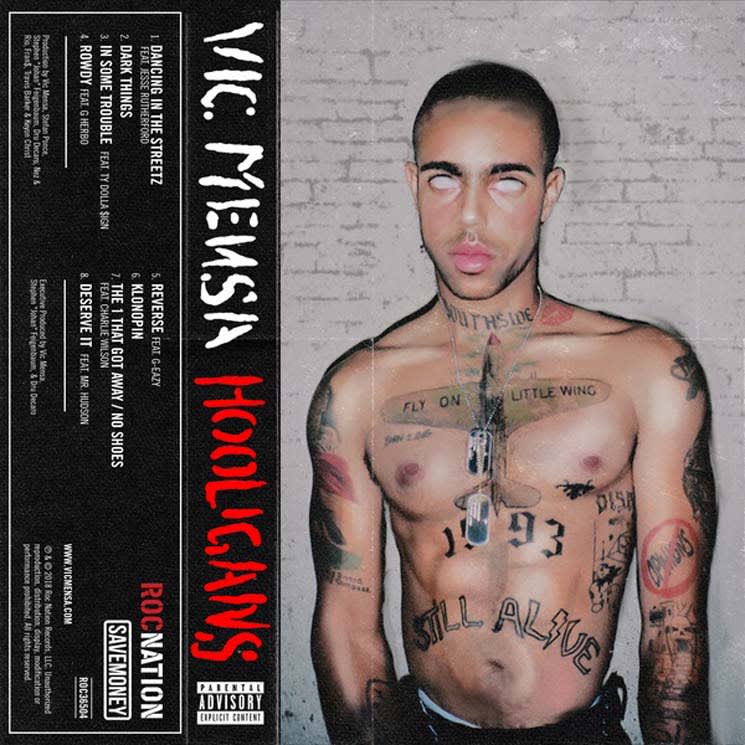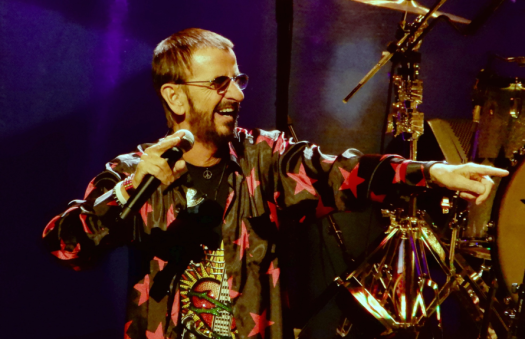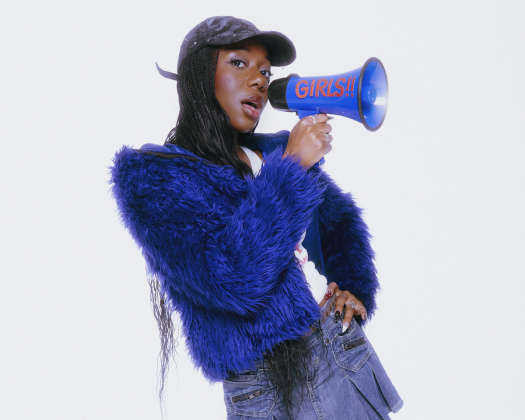"Vino the Agitator" is what his Twitter name says. Hailing from Chicago, IL, 24-year old Vic Mensa is more than a rapper — he's a rabble-rouser who just happens to use hip-hop culture as his platform to educate and empower the communities around him.
Before performing his socio-conscious single "We Can Be Free" on the night of Jay-Z's 4:44 tour in Toronto, the Roc Nation signee took a moment to express how thankful he was to be in Canada. But why? "I was thinking about the South Park movie, and I don't wanna piss off Canadians, but when I was a little kid I remember the South Park movie and I just remember laughing like 'Canada's not [as good as] America,'" he jokes. "But I realize how much Canada has figured out that we don't have figured out in America [and how] to not deal with the same drama that we deal with, at least not on the same scale. It's funny how as time passes, our perspectives change," he says with a reserved tone.
Those perspectives lead Vic Mensa from the depths of community hardship towards music, including his 2017 debut, The Autobiography. "There was a period of time I was living in a house in Beverly Hills and we made a lot of music in this one month," he notes. "Then [when] I moved out of that crib and I went back to Chicago, I found myself involved in so much dark energy, you know? A lot of betrayal, violence and paranoia, and it was really difficult for me to write about it for some time. A lesson that I've learned and been learning is to appreciate the current moment — the now, and take myself out of the past and future so much and be present."
The Autobiography is just as much as a musical project than it is an journal entry, and since he's already working on new music for 2018, Mensa comments, "I'm less of a planner and more of a doer."
With present-day America at war with itself, from an economic, political and social standpoint, Mensa's ongoing quest is to take action before its too late.
"The biggest barrier to racial harmony and unity is the unwillingness to empathize with people you don't understand," he explains. "I am conscious of the fact that a lot of people consuming my music would consider themselves white. People do tell me that my music has helped them to open that discussion, and look at the world differently. I think that's important because there can be no progress on the subjective race relations in American without a widespread evolution of thought amongst white people."
Musically, The Autobiography serves as just one chapter in his career, but Mensa's experiences and values within it share a lifetime of lessons.
"Although you may not understand where someone is coming from or the circumstances that has lead [them] to a certain life situation, you should be accepting of people's quest for happiness, freedom, self-sufficiency."
The Autobiography is out now on Roc Nation/Def Jam.
Before performing his socio-conscious single "We Can Be Free" on the night of Jay-Z's 4:44 tour in Toronto, the Roc Nation signee took a moment to express how thankful he was to be in Canada. But why? "I was thinking about the South Park movie, and I don't wanna piss off Canadians, but when I was a little kid I remember the South Park movie and I just remember laughing like 'Canada's not [as good as] America,'" he jokes. "But I realize how much Canada has figured out that we don't have figured out in America [and how] to not deal with the same drama that we deal with, at least not on the same scale. It's funny how as time passes, our perspectives change," he says with a reserved tone.
Those perspectives lead Vic Mensa from the depths of community hardship towards music, including his 2017 debut, The Autobiography. "There was a period of time I was living in a house in Beverly Hills and we made a lot of music in this one month," he notes. "Then [when] I moved out of that crib and I went back to Chicago, I found myself involved in so much dark energy, you know? A lot of betrayal, violence and paranoia, and it was really difficult for me to write about it for some time. A lesson that I've learned and been learning is to appreciate the current moment — the now, and take myself out of the past and future so much and be present."
The Autobiography is just as much as a musical project than it is an journal entry, and since he's already working on new music for 2018, Mensa comments, "I'm less of a planner and more of a doer."
With present-day America at war with itself, from an economic, political and social standpoint, Mensa's ongoing quest is to take action before its too late.
"The biggest barrier to racial harmony and unity is the unwillingness to empathize with people you don't understand," he explains. "I am conscious of the fact that a lot of people consuming my music would consider themselves white. People do tell me that my music has helped them to open that discussion, and look at the world differently. I think that's important because there can be no progress on the subjective race relations in American without a widespread evolution of thought amongst white people."
Musically, The Autobiography serves as just one chapter in his career, but Mensa's experiences and values within it share a lifetime of lessons.
"Although you may not understand where someone is coming from or the circumstances that has lead [them] to a certain life situation, you should be accepting of people's quest for happiness, freedom, self-sufficiency."
The Autobiography is out now on Roc Nation/Def Jam.




